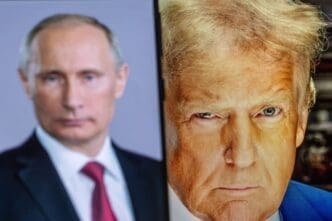In an unexpected shift, Russia is re-evaluating its adversarial stance towards the U.S. This change follows years of tensions amplified by the war in Ukraine and a history of demonizing American leadership, economy, and culture.
Since the invasion of Ukraine three years ago, Russia dedicated significant resources to portraying the U.S. as its main enemy, criticizing both its leadership and its perceived global dominance. The situation escalated with U.S.-led sanctions, causing further strain on Russia’s economy and elite. However, a new administration in the U.S. under President Donald Trump has initiated talks aimed at resolving the conflict in Ukraine, resulting in a noticeable softening of Moscow’s rhetoric.
Russian President Vladimir Putin, after initial talks in Saudi Arabia, praised the negotiations with the U.S. for their friendly atmosphere. According to Putin, the American delegation displayed a new openness, free from past biases, marking a shift in relations. The Kremlin spokesperson emphasized a focus on reviving U.S.-Russia relations, while Russian Foreign Minister Sergey Lavrov highlighted the constructive nature of the discussions, suggesting a move away from previous tensions rooted in the Biden administration’s policies.
The potential economic benefits of ending the Ukraine conflict are considerable for Russia. The war has put immense pressure on its economy, with increased military production contributing to inflation. Despite this, Russia reported a 3.8% economic growth in 2024, although forecasts for 2025 predict a slowdown. A peace deal could alleviate sanctions, boosting the Russian economy and possibly increasing gas exports to Europe.
Nevertheless, the evolving diplomatic ties between the U.S. and Russia have provoked frustration in Ukraine and among its European allies. Ukraine’s exclusion from talks has led to accusations of misinformation being spread by Russia. Political tensions have heightened, illustrated by Donald Trump’s recent controversial remarks about Ukrainian President Volodymyr Zelenskyy’s leadership. There remains skepticism about whether Russia will shift from its war-oriented economy, as some experts suggest this move could strengthen autocratic alliances, impacting global dynamics.
Russia’s unexpected U-turn in its relations with the United States signals a potentially new direction in global diplomacy. As peace talks progress, the outcome could significantly influence both economic stability and geopolitical relationships. This development underscores the complexity of international relations and the intricate balance of power between nations.








